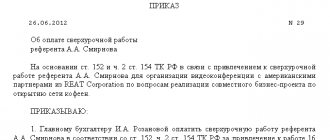Time off is usually called additional days off provided to employees as compensation for overtime or in other cases provided for by law. The term “time off” itself is absent in labor legislation.
The Labor Code provides compensation in the form of additional days off for the following types of overtime:
- working overtime. According to Article 152 of the Labor Code, it can be compensated by increasing wages or providing rest time no less than the amount worked above the norm;
- work on a weekend or holiday. The norms are regulated by Article 113 of the Labor Code;
- accumulated overtime hours on a rotational basis (Article 301 of the Labor Code);
- work in emergency or emergency situations (Article 113 of the Labor Code).
The right to compensation arises if the processing was caused by production necessity, and it was initiated by the employer.
It must also be documented.
What counts as recycling?
Overtime work is not every overtime.
For example, if an employee voluntarily stays late at work, then there is no point in applying for increased pay. Then what hours should be considered paid? It is important to comply with two requirements enshrined in Article 99 of the Labor Code of the Russian Federation:
- the period of work goes beyond the standard working hours of a specialist, that is, it does not coincide with the length of the working day or shift;
- overtime has to be done at the insistence of the company management, that is, the employee’s own initiative does not apply to overtime work.
If you systematically stay late without a corresponding order from your superiors, you should not expect a double salary. It is important for both the employee and the employer to remember to observe labor discipline. Follow the rules:
- The employer notifies the subordinate of the need to engage in overtime work.
- A specialist can only be engaged with his written consent. Some employees should not be involved in non-standard work at all (pregnant women, minors). Certain categories of specialists must be notified of the right to refuse such an offer (disabled people, for example).
- Having agreed on non-standard work, the employer issues an order setting out all the necessary conditions. For example, the duration of processing, payment, working conditions, etc.
- Interested persons are familiarized with the order. Then the order is transferred to the accounting service for calculations.
The accounting employee calculates wages taking into account the actual volume of processing, payment terms and current norms of the Labor Code of the Russian Federation.
IMPORTANT!
If the employee’s employment contract states that he works on an irregular work schedule, then there should be no talk of overtime. Increased pay for overtime hours is offset by additional rest time. That is, instead of a cash payment to an employee who works irregular hours, additional days of vacation are provided. The conditions for additional rest time must be enshrined in the collective agreement.
The procedure for paying time off in general
The Labor Code absolutely does not provide for any kind of payment for time off in principle, with the exception of one situation - if such time off is taken to donate blood and subsequent recovery after such a procedure. Then the employer is obliged to provide the employee with fully paid rest without the possibility of refusing to exercise such a right.
Important fact: according to the standards of Art. 186 of the Labor Code of the Russian Federation, when an employee donates blood, the employer is responsible for paying for the day of the medical examination, the donation of blood components itself, as well as the next day after the blood is drawn. By agreement of the parties to the labor relationship, they can come to a decision regarding work on the days described above with the subsequent inclusion of the required rest days in calculating the duration of the payable vacation.
It should be noted that days off cannot be subject to the collection of insurance contributions to the Social Insurance Fund and the Pension Fund. Both if, in accordance with the employment contract, the enterprise has established a daily or hourly system for calculating wages, taking into account the time spent, and when working on a fixed salary, since the accounting department must note the absence of the employee. Also, if the total annual number of days off exceeds 15 days, the countdown period for paid leave will be shifted to all days above the above number.
How are processing times calculated?
The working hours for each specialist are calculated separately. For example, a 40-hour work week is considered the standard (Article 90 of the Labor Code of the Russian Federation). But for some specialists, reduced work hours are established. For example, for teachers or doctors. For them, the calculation of overworked hours is not calculated from the 40-hour week, but from the reduced norm.
The volume of processing is strictly limited by law. The following cannot be involved in overtime work (Part 6, Article 99 of the Labor Code of the Russian Federation):
- 4 hours two days in a row;
- more than 120 hours per year.
Overtime hours should be recorded on time sheets. The procedure for reflecting overtime depends on the form of the report card used in the organization.
The calculation of overtime fees depends on the duration. For the first two hours you will be paid one and a half times the standard rate. For the rest of the time - no less than double the amount. The norms are regulated in Art. 152 Labor Code of the Russian Federation.
The employer has the right to increase overtime pay rates. The specific amount of allowances is determined individually, depending on the financial situation of the company. But you cannot pay less than what is enshrined in the Labor Code. The specific amounts of payments should be fixed in a local act of the organization. The legislation does not contain a minimum or maximum amount of payments.
IMPORTANT!
An employee has the right to refuse an increased premium for overtime work, replacing the money with additional rest time. To do this, the subordinate must write an application for time off. This must be done no later than the last day of the month or billing period in which the processing took place.
Salaries and layoffs
“Many people do not know their labor rights, and employers take advantage of this,” says Sergei Saurin, deputy chairman of the board of the NP Lawyers for Labor Rights. “Now we are receiving a lot of complaints about delays in salaries: “We haven’t seen the money for 2 months, we don’t know what to feed the children.”
People suffer and do not know that the Labor Code sets out an algorithm of actions for them: if a salary or even part of it is delayed for more than 15 days, you can notify the employer in writing and not go to work (Article 142 of the Labor Code). This measure, as well as appeals to the labor inspectorate and the court, usually have a sobering effect on employers. It is enough for a person to let his boss know that he is familiar with labor legislation, and they begin to talk to him differently. Article on the topic Pay and sleep well! Failure to pay wages threatens the employer with prison
Let's say a company is laying off staff. Employees are called one by one and forced to write a statement of their own free will: “If you don’t leave in an amicable way, we’ll fire you under the article!” A person who does not know the laws will leave with nothing or accept a handout - he will sign an “agreement of the parties” with a severance pay of 1 salary. An employee who knows his rights will not succumb to threats (dismissal under the article can only be for theft, embezzlement, absenteeism, drunkenness, etc.), will demand more money or dismissal due to staff reduction. This means that by law they are required to give him 2 months’ notice, the person will work it out and receive 2 salaries (Article 180 of the Labor Code). Then he is entitled to severance pay - 1 average salary. If he does not get a new job within 2 months, he must be given another salary at his previous one. Moreover, if a person registers with the employment center and does not find a job with its help, the former employer must also pay for the 3rd month. That is, from the moment of notification of dismissal, a person can receive 5 salaries (Article 178 of the Labor Code). That’s why you need to bargain with your employer - if he wants to part with you quickly, let him pay “by agreement of the parties” 3-5 salaries.”
Full half-day protection. What changes await Russian workers Read more
Salary calculation
Salary or tariff rate is the most common form of remuneration in Russia. The employer assigns the employee a specific salary or rate for a fully worked norm. The calculation of overtime working hours at a salary is calculated based on the hourly share of the salary or rate.
First, the accountant calculates the cost of one hour of work for a specific specialist. There are several ways to calculate the hourly rate. For example, it is enough to divide the official salary by the number of working hours in the billing month. Or another option: we divide the salary by the average annual working time (standard working hours per year / 12 months).
IMPORTANT!
The method for calculating the hourly share of the salary or tariff rate must be enshrined in the local acts of the institution. Calculation based on the average annual working time is more beneficial for workers (Letter of the Ministry of Labor dated 08/09/2002 No. 1202-21).
The result obtained remains to be multiplied by the number of hours worked, taking into account the increasing factor. That is, we multiply the hourly salary by a factor of 1.5 for the first 2 overtime hours. The remaining processing time is calculated with a factor of 2.
Calculation example
A.P. Morkovkin’s official salary — 50,000 rubles. In May 2021, the standard working hours is 144. Processing in May was 5.5 hours.
We calculate the additional payment for processing:
- We calculate the hourly salary: 50,000 / 144 hours = 347.22 rubles.
- We calculate the additional payment for the first 2 hours: 347.22 × 1.5 × 2 hours = 1041.66 rubles.
- We calculate the remaining processing time: 5.5 – 2 hours = 3.5 hours.
- Calculation of the allowance for the rest of the time: 347.22 × 2 × 3.5 = 2430.54 rubles.
Total additional payment for processing: 1041.66 + 2430.54 = 3472.20 rubles.
The employee has the right to refuse increased pay and replace it with additional rest time.
IMPORTANT!
Additional payment for work in non-standard conditions from 04/11/2021 cannot be taken into account when comparing earnings with the minimum wage (Decision of the Constitutional Court of the Russian Federation No. 17-P of 04/11/2021). Therefore, additional payment for night, holiday, weekend or overtime work is calculated in excess of the minimum wage.
How are time off for overtime work provided?
An employee who has overtime hours has the right to receive either additional pay or time off.
In this case, the type of compensation is determined by the employee. It is at the request of the worker that previously worked overtime can be replaced by rest.
At the same time, according to the Labor Code of the Russian Federation, the employer is obliged to provide rest for a duration of at least overtime.
That is, each hour of overtime entitles you to at least 1 hour of compensatory time off.
To get a full day off, a person must work 8 hours of overtime.
The employee can choose additional payment for overtime worked. The first 2 hours are paid at one and a half times, and the subsequent ones - at double.
The indicated duration of rest provided for overtime, as well as the amount of increased pay, are the minimum possible indicators established by the Labor Code.
The employer can, on his own initiative, increase compensation by stipulating this point in the local acts of the organization.
If an employee works overtime on a non-working holiday or a calendar day off, then other rules from . This time is not taken into account in the calculation of overtime on working days.
How long can I take it?
It is important that only at the request of the employee can overtime hours be compensated with time off.
If an employee does not want to, then the employer does not have the right to force, coerce or force him to rest.
By law, the employer is, first of all, obliged to pay overtime at an increased rate.
If the employee wants to rest, then overtime is paid in a single amount, plus time for rest is added to this.
The Labor Code of the Russian Federation does not contain any restrictions regarding when you can exercise the right to time off.
If there are no prohibitions or restrictions, then theoretically the worker has the right to demand time off both in the current month, when overtime is recorded, and in subsequent ones.
This is true if overtime hours were not previously paid at an increased rate.
In practice, employees often accumulate overtime hours in order to later take days off. For example, 8 accumulated overtime hours gives a day of rest, and 16 hours gives 2 days off.
What to do with accumulated time off upon dismissal?
To take time off for previously worked overtime hours, you need to write an application. Only a written expression of the employee’s intention to rest can serve as a basis for the employer to provide rest.
Are they paid according to the Labor Code of the Russian Federation?
Rest time provided as compensation for overtime is not subject to payment.
If an employee chooses rest instead of increased pay, then he receives a single rate of pay for hours worked overtime, and the time off is not paid.
For example, on June 25, 2021, with an 8-hour working day from 9.00 to 18.00, an employee remained at work until 20.00 to complete work tasks.
2 hours of processing can:
- be paid at one and a half times the rate;
- paid in a single amount + 2 hours of time off are provided.
These indicators may be higher if the employer provides for this in its local regulations.
It is the employee who decides how exactly he will be compensated for work beyond the required norm.
Often this point is discussed in advance in the order, which formalizes the need to delay the employee at work.
Are they paid according to the Labor Code of the Russian Federation?
In accordance with Part 3 of Article 153 of the Labor Code of the Russian Federation, an employee can choose to be given time off instead of the time worked over.
In this case, payment for the day worked is carried out as usual, but for the day off taken, earnings are not accrued.
Thus, time off provided for overtime is not paid, since according to the time sheet, such a day is marked as a non-working day.
Instead of time off, the employee has the right to ask for compensation for overtime in cash. The calculation of the amount of payment for overtime work is carried out depending on the provisions of Art. 153 Labor Code of the Russian Federation.
The Labor Code establishes that if an employee does not want to take time off for previously worked overtime, but wants to receive increased monetary remuneration, then the amount of payment for hours and days of overtime must be no less than 2 times higher.
Collective agreements and internal regulations are important in establishing the amount of compensation. They set out the conditions under which employees are involved in overtime work, the amount of compensation for work performed during non-working hours, as well as the procedure according to which time off is provided for overtime.
If an employee goes to work on a holiday or calendar day off, then the provision of time off follows different rules.
How to properly arrange a day off for overworked time?
First of all, the employer and employee need to remember that overtime work is possible only on the basis of an order from the manager.
The order may indicate the method of compensation.
An employee has the right to take time off instead of overtime hours previously worked on the basis of an application.
It is written in free form, it states a request for time off, indicates exactly how many hours or days the applicant plans to rest, at what time and for what reason. For credibility, a link is provided.
The text does not use the concept of “time off” due to its absence in labor legislation. You should ask for rest or days off.
The application is certified by the employee’s personal signature, dated and transferred to the personnel service or other responsible person.
The employer reviews the application and puts its resolution on granting time off.
Based on the application, an order is drawn up to provide unpaid time off in connection with compensation for overtime overtime in excess of the labor standard.
The order is approved by the director and submitted to the employee for approval.
Only after the employee has personally signed the order may he not go to work.
If there is no order, then you should go to the workplace, otherwise the employer may regard the person’s absence as absenteeism.
An important point is that if the order on the need for overtime indicated that the employee will be given time to rest for overtime hours, then there is no need to issue another order, just as there is no need to write a statement to the employee.
The employee automatically agrees to the replacement of overtime with time off when he puts an introductory signature on the order.
How to write an application?
The main documents when a day off for overtime work is issued are an order and a statement. Without them, a day off is not provided.
When requesting time off for previously worked overtime, the application must contain the following information.
- Initials, as well as the position of the boss to whom the application is written.
- Name of the institution.
- Indication of the type of document - “Application”.
- Applicant's initials.
- A request for time off in the required amount, indicating a specific number.
- The reason for the request is for processing, indicating the date when it was.
- Date of application.
What to do if the employer refuses?
If the manager does not provide time off for overtime, then you first need to check whether such workdays are paid at an increased rate.
Then you can try to find a common compromise solution with your superiors - perhaps, due to production circumstances, he cannot provide time off in the coming week, but is able to do so the next.
When all efforts to reach an agreement remain in vain, you can file a complaint with the labor inspectorate and attach a duplicate of the application as a sign that the employee made requests to the employer.
It is strictly prohibited to take leave on your own without permission from management.
Is it necessary to issue an order?
The need to fulfill or exceed the production plan does not always fit into the framework of working hours. In this case, there is a need to organize work beyond the normal duration of the shift, but overtime work according to the Labor Code of the Russian Federation has restrictions on attracting personnel to work outside the limits of the normal working day. In addition to its own restrictions established by Article 99 of the Labor Code of the Russian Federation, involvement in such work requires additional payment for overtime hours, which is established by Article 152 of the Labor Code of the Russian Federation.
The Labor Code of the Russian Federation does not indicate that registration of overtime work requires the issuance of a separate order from the manager. The main requirement is the employee’s written consent to work beyond the norm.
An exception is the cases listed in Part 3 of Art. 99 Labor Code of the Russian Federation. The employee’s consent may not be asked if:
- there is a need to prevent an accident or natural disaster;
- engage an employee to eliminate a breakdown that interferes with the enterprise’s water supply, lighting, communications, transport and other communications;
- An emergency arose, martial law was introduced, etc.
Despite the fact that in the above cases the employee’s written consent to overtime work is not necessary, overtime must be formalized and paid for.
For payment, overtime time in the time sheet is indicated by the code “C” or “04”. The basis for paying overtime hours is the timesheet.
The following categories of employees have the right to refuse overtime work:
- disabled people;
- women raising children under three years of age;
- a parent raising a child under five years of age alone;
- citizens raising disabled children;
- employees caring for a sick relative.
Such employees must be informed in writing of the possibility of refusing overtime work. This information can be indicated in the order. Managers of organizations should be aware that it is prohibited to involve pregnant employees and minors in extracurricular work.
Overtime according to shift schedule, time off or compensation
Accounting is done directly by the employer. The production rate can be calculated according to the rules provided for by the Labor Code of the Russian Federation. Recycling is calculated in hours. Overtime is voluntary, which is why employee refusal is allowed. For additional work time, you can receive both monetary compensation and time off.
When it is legal to demand time off for overtime - important subtleties in providing according to the Labor Code of the Russian Federation advocatus Shift workers have a nuance in paying for holidays: if the work was performed within the employee’s normal working hours in the corresponding period, then replacing this day with the consent of the employee with single pay and time off is not it will turn out p. But if such work on a holiday is performed in excess of normal working hours, the employee chooses himself: either double pay, or single pay plus time off.
Mandatory right to non-categorical leave No one can argue with the statement that an offer to work longer is expressed by superiors more persistently than a willingness to let go from work. But, when the working hours are already recorded in the time sheet or there are unpaid rest days for previous periods, it is much easier to force the employee to heed his requests. VIDEO ON THE TOPIC: How to get time off or payment for overtime
How much and how are overtime hours paid?
Organizational managers are often interested in how much to pay for overtime worked by an employee? For greater clarity, we have placed a table:
| Period of extracurricular work | Overtime pay |
| First 2 hours | Must be paid at least one and a half times the amount |
| Subsequent hours | At least double the size |
The amount of payment for overtime work indicated in the table is considered minimal, that is, the employer does not have the right to pay less. But the amount of payment for work above the norm can be increased by the head of the enterprise. Information about this should be indicated in the company’s local act or employment contract with the employee.
If the employee does not mind, the organization can compensate him for the time worked above the norm, not in cash, but with additional days off. The duration of the non-working period cannot be less than the time spent on work. But such overtime work is paid at a single rate.
If processing is the employee’s own initiative, then such work is not extracurricular and is not paid.
Time off for extenuating circumstances, the obligation to issue them and payment features
Art. 128 of the Labor Code of the Russian Federation provides for the possibility for certain categories of persons, as well as in the presence of certain circumstances, to require the customer to provide them with compulsory time off in the number of days established by the provisions of this article. The employer is obliged to satisfy such requirements of employees if they meet the following situations:
- Working pensioners may require 14 days of leave during the year;
- 35 days are due to participants of the Second World War;
- 60 days – for disabled people;
- 5 days - for each individual case of marriage, birth of a child or death of a close relative.
Also, student workers have the right to forcefully demand time off for passing exams, submitting reports and standards in their educational institutions, and some other categories of persons, for example, those who have certain state awards.
An important fact: for the reasons described above, employees have the right to take time off in any number of permissible days at any time convenient for them, distributing them at their discretion during the working year. Thus, a disabled worker can demand time off for, for example, every Monday of the year, and the employer cannot refuse him this.
What methods of recording working hours exist?
Choosing a method for recording working time is a concern for managers. Much in this matter depends on the scope of the organization. The chosen type of accounting must be specified by the director of the company in the internal regulations. The following types of accounting are distinguished:
- daily;
- Monday;
- summarized.
With summarized accounting, there may be a deviation in the duration of working hours during the day, week or month. The main requirement: at the end of the accounting period, the employee must have worked a number of hours in accordance with the approved norm.
The standard working day is 8 hours. With a five-day working week, the working time limit reaches 40 hours. But there are exceptions. If a person works a shift, his working day can last 12 hours. For some categories of employees, a shortened working day may be established. In this case, their working week is 24-36 hours. You can find out how much time a worker with a normal or reduced working day must work per month, quarter and year using the production calendar. Using a regular calculator, it will not be difficult to calculate recycling.
In the case of daily accounting, overtime or shortfalls are recorded within one day. Labor payment is calculated for each day of processing separately. And overtime (payment) is given at the end of the month.
Overtime pay: example
Let's look at a specific example of how to calculate overtime (2021). Manager Barulin V.M. worked 3 hours after hours on 03/03/2021 and 4 hours on 03/10/2021. His hourly earnings are 140 rubles. The first two hours of each overtime must be paid at one and a half times the rate. The rest of the time is double time. The amount will be:
March 3 = (140 rub. × 1.5 × 2 hours) (140 rub. × 2 × 1 hour) = 700 rub.
March 10 = (140 rubles × 1.5 × 2 hours) (140 rubles × 2 × 2 hours) = 980 rubles.
Barulin V.M. 1680 rubles will be credited. for extra work.
When recording working hours in aggregate, overtime work (payment) should be assessed as follows: time worked outside of normal hours is calculated based on the results of the accounting period. The first two hours of work are paid at least time and a half. The rest of the time is double time.









